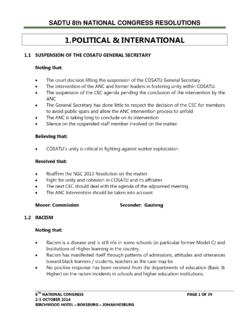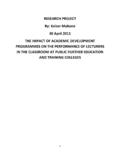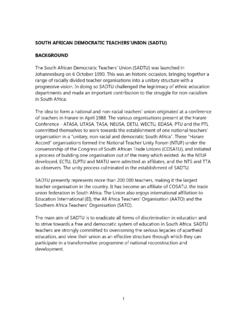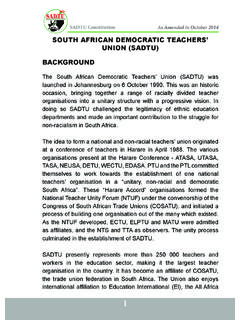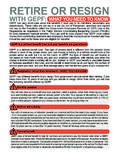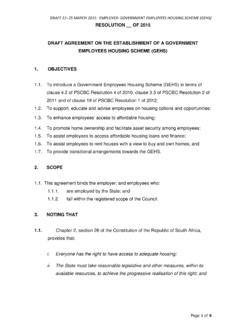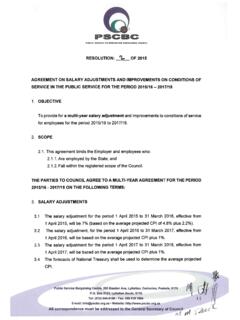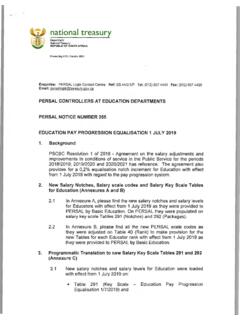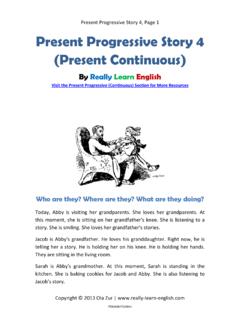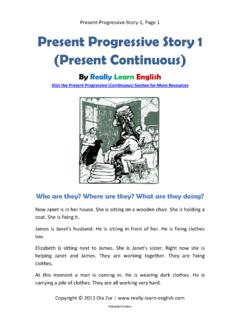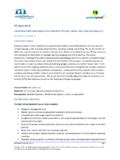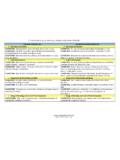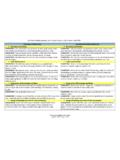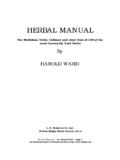Transcription of The importance of Teaching History as a …
1 1 | Page The importance of Teaching History as a Compulsory Subject Until the lions have their own historians, the History of the hunt will always glorify the hunter Chinua Achebe (Things Fall Apart, 1958) These words of one of our African son could not have been more relevant in the context of our society than at this present South Africa we find ourselves. We find a country of lost identity, whose History is contested by anyone who wishes to write their opinions on social media and personal researches about where we come from, and where we are heading.
2 It is on the basis of our History written by foreign minds who glorify colonialists and not the real heroes of the South African struggle against both the colonial and apartheid regime that SADTU believes it is about time our History is told by South Africans. We want to write it to ourselves in order to map a way forward in advancing a developmental state. SADTU wants the real South African History to be part of the curriculum as a compulsory subject in basic education. After the attainment of democracy in 1994, the ANC- led government demanded an overhaul of the education system; the idea was to replace it with a more representative one.
3 This change was widely supported within academia. The claim advanced was for schools to reflect the demography of the South African society (Hall (2006), Moja, Muller and Cloete (1996) Kulati (2000), Cloete, 2002; Hall et al, (2000), Badat and Wolpe, (1993). Along this line of thought, many argued that optimal transformation in schools must include change of curriculum. The thinking was to address social transformation, high quality Teaching and learning based on the Constitution of the Republic of South Africa.)
4 However, there seems to be very limited understanding about the best way to address the question of social transformation through education based on the Constitution of the Republic of South Africa. Such an understanding is central to ensuring that effective strategies are put in place to achieve the objectives of the Education and the spirit of the Constitution. It is this particular aspect that this to paper sets out to address. 2 | Page South Africa lags behind other countries in terms of robust Teaching of History as a subject that can help celebrate the heritage, culture and values that made South Africa as known today.
5 Instead it has to rely in fragmented Teaching of History at primary level, optional Teaching of History at secondary level and History as a choice discipline that is but quickly fading at tertiary level. Ultimately the future preservation of our culture and heritage lies in the preservation of our heritage, culture and values through education, and that means Teaching History as a compulsory subject at school level to provide a foundation of much needed celebration of our past. Education is a feature that is commonly used by societies to transmit what society deems important.
6 History is a valuable instrument through which such a goal could be achieved. Failure to recognize this would be a colossal mistake that could be felt for decades to come. History is what makes people see in themselves, as different, as similar and yet as bound by more that their distinguished tribes or races. This strikes at the core of and is related to issues of individual, personal and group identity. Although History is a contentious and at times controversial aspect of education, it has shaped so much of education today.
7 At times it raises highly charged issues that have the potential to open up deep wounds for some but it also allows a process of healing, acceptance of the past as it was and the possibility of even embracing the past and using it as a lesson well learnt for the future. History introduces learners to the critical dimensions of the life of the society and further inducts them into educational, historical and cultural discourses underpinning the society, how it evolved and things that contributed to this evolution and offers preliminary understanding of the roles of all these discourses in how society is today as it relates to their current circumstances.
8 By so doing, it emphasis what is at the core of what made a particular society and how it was constructed including what if any, is at the centre of this construction. It is envisaged that through History learners will come to appreciate different related and inter- related factors that makes the South African society more meaningful in terms of how it 3 | Page developed, its practical experiences all of which manifest in the way society constructs itself even to this day. History is a discovery project.
9 It is a process that learners undergo that cognitively adds to them knowing what happened in the past with regards to their present lives. It helps shapes learners world views and also assists in making them take positions informed by their past. It helps learners to evaluate and re- evaluate how their past contributed to their present and how it might help shape their future. Through History it may be possible for learners to connect the dots of their current lives and how it came to be.
10 Connecting these dots could help them understand how the past evolved and just how it shaped the present. All these connections could eventually have meaning to learners. History is informative in a way that is interesting and important especially if it is taught in unbiased way that presents all the facts as they happened. It can free learners to move on with their lives if they better understand how it impacted the present since it present opportunities for lessons learnt in order to avoid repetition of the mistakes made.
